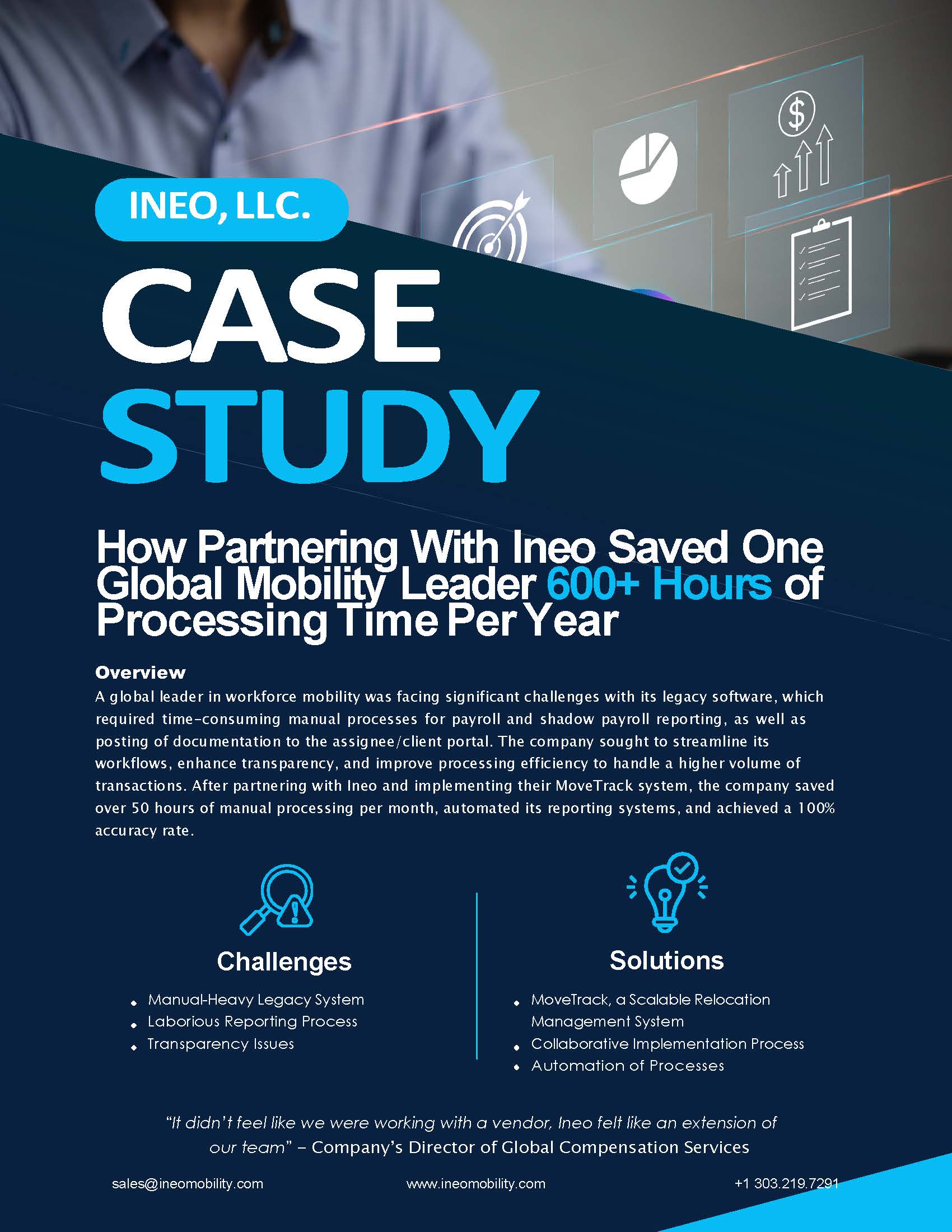A global mobility tax consultant specializes in understanding and navigating the intricate tax implications of international and domestic employee relocations. Their expertise encompasses ensuring compliance with multi-jurisdictional tax laws, reviewing and revising mobility and gross-up policies, reviewing compensation data related to proper corporate reporting compliance, and keeping companies updated on evolving tax regulations. The primary goal of global mobility tax expert is to help companies manage their mobile workforce in a tax-efficient and compliant manner, mitigating risks and optimizing costs.
Global Mobility Tax Policy Consulting
Ensure your mobility policies comply with global tax laws for Social Security and Medicare payroll tax and withholding.
Contact UsAbout Our Global Mobility Tax Policy Consulting Service

When was the last time you reviewed your global mobility program US tax policy? Mobility tax is complicated… and the tax implications and compliance risk can be daunting, especially when tax returns need to be filed in multiple jurisdictions. This couldn’t be truer with the passage of the Tax Cuts and Jobs Act, causing all companies to review their policies and policy language. Even though global tax rules have changed and the tax issues related to a mobile workforce are complex, global businesses still need to make sure they are in line with the law to ensure tax compliance.
Based on the different types of moves or assignments, very different payroll tax withholding regulations apply, as do very different gross-up policies.
Ineo Global Mobility Tax Services provides expert-level review to corporate mobility programs and RMCs to ensure your mobility policies comply with Social Security and Medicare payroll tax and withholding laws.
Line-By-Line, or Policy-By-Policy Review
Our mobility tax experts will look at each individual component from a global tax compliance perspective and offer guidance on necessary revisions.
Accurate Tax Coding According to Policy
We ensure that each and every expense category mobile employees might incur is tax-coded correctly within the policy.
Gross-Up Policy Review & Revisions
Our experts will review and revise your gross-up policies, for while these policies may seem similar to payroll withholding laws, there are significant differences.

Global Mobility Resources
Learn more about what’s going on at Ineo and insights into the complex world of global mobility from the industry’s top thought leaders and innovators.

Order the Tax Support You Require Today!
In addition to consultative support, we also offer an annual Mobility Tax Advisor Guide and Q&A Subscriptions so we can better meet your tax needs, whatever they may be.
Or, make a secure payment to Ineo here
Contact Us
Whether you are new to the world of global mobility or you’ve been in the business for a while, Ineo is here to assist you.
Contact us to learn how our global tax consultancy can support your global mobility program.
Get StartedFrequently Asked Questions

Ineo’s global tax consultancy enhances your company’s global mobility program by offering comprehensive services including expert-level policy reviews, compensation data review for proper corporate reporting, and tax gross-ups, equalization review/advice, and supporting calculations, all ensuring compliance with global tax laws. We provide additional resources such as the annual Mobility Tax Advisor Guide and Q&A Subscriptions for ongoing support.

Not complying with global tax laws for Social Security, Medicare payroll tax, and withholding can have several serious implications:
- Financial penalties: Not meeting compliance requirements can result in substantial fines, penalties, and interest charges. These can be levied by multiple jurisdictions, leading to significant financial burdens for companies.
- Legal consequences: Companies may face legal actions or lawsuits in jurisdictions where they didn’t ensure tax compliance, which can be costly and time-consuming.
- Reputational damage: Non-compliance can tarnish a company’s reputation, making it challenging to do business in affected regions or globally. It can also impact relationships with partners, stakeholders, and customers.
- Operational disruptions: Regulatory bodies may impose sanctions or restrictions on a company’s operations, affecting its ability to operate seamlessly across borders.
- Employee impact: Mobile employees might face personal tax liabilities, penalties, or legal issues if their employer doesn’t correctly handle their tax withholdings. This can lead to dissatisfaction, reduced morale, and potential loss of talent.
- Increased scrutiny: Once a company is flagged for non-compliance, it may be subjected to more frequent and rigorous audits in the future, leading to increased administrative burdens.
- Loss of business opportunities: Some clients or partners may choose not to do business with companies with a history of non-compliance, viewing them as high-risk.

Ineo ensures that mobility policies are in compliance with global tax laws by providing expert-level reviews of corporate mobility programs. Our mobility tax experts conduct a line-by-line or policy-by-policy review of each individual component from a global tax compliance perspective and offer guidance on necessary revisions. Additionally, we ensure that each and every expense category that mobile employees might incur is tax-coded correctly within the policy and review and revise gross-up policies, highlighting the differences these policies may have compared to payroll withholding laws.

Different types of international moves or assignments can have varied implications on payroll tax withholding regulations due to the diverse nature of work arrangements, durations, and jurisdictions involved.
- Short-term assignments: Typically lasting less than a year, these assignments might not change an employee’s tax residency. However, depending on the jurisdictions involved, there might be requirements to withhold taxes in both the home and host countries.
- Long-term assignments: These usually last for more than a year and can change an employee’s tax residency status. The employee might become liable for taxes in the host country while still having some tax obligations in their home country.
- Permanent transfers: When an employee moves to another country permanently, they typically become tax residents of the new host country and cease to be tax residents of their true home country. This shift affects where and how their income is taxed.
- Rotational or commuter assignments: Employees working in one country but returning to their home country frequently (e.g., every week or month) might face dual tax obligations. Both countries could claim tax on the same income, necessitating the use of tax treaties to avoid double taxation.
- Remote work or telecommuting: With the rise of remote work, employees working from a different country than their employer’s location can create complex tax situations. The employee might owe taxes in both their location of work and the company’s jurisdiction.
- Business travelers: Frequent business travelers who aren’t on formal assignments can inadvertently create tax liabilities if they exceed specific thresholds of days spent in a foreign country.

The Tax Cuts and Jobs Act (TCJA) introduced significant alterations to the U.S. tax code, affecting global mobility tax policies. Key changes include:
- The suspension of moving expense deductions
- Adjustments in individual tax rates
- A cap on the State and Local Tax (SALT) deduction
- The introduction of a transition tax on deferred foreign income and provisions to tax Global Intangible Low-Taxed Income (GILTI)
- A reduction in the corporate tax rate
These changes necessitate that global businesses or employees on global assignments reevaluate their mobility policies to ensure tax compliance and tax optimization.




